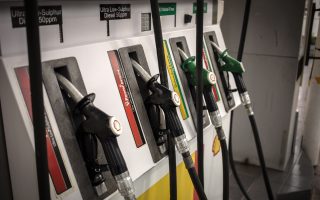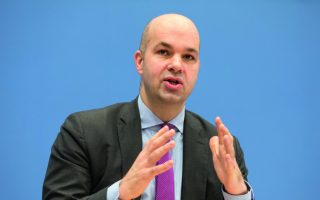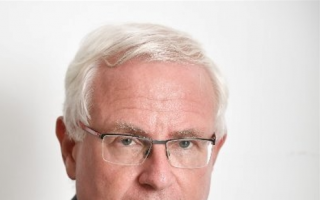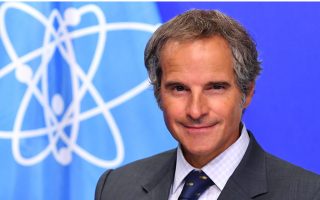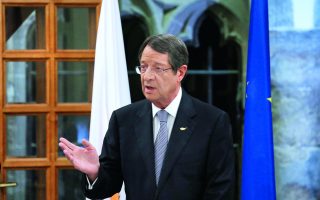Greece key to Europe’s energy security
US Senator speaks to Kathimerini about the challenges facing the West in the wake of Russia’s invasion of Ukraine
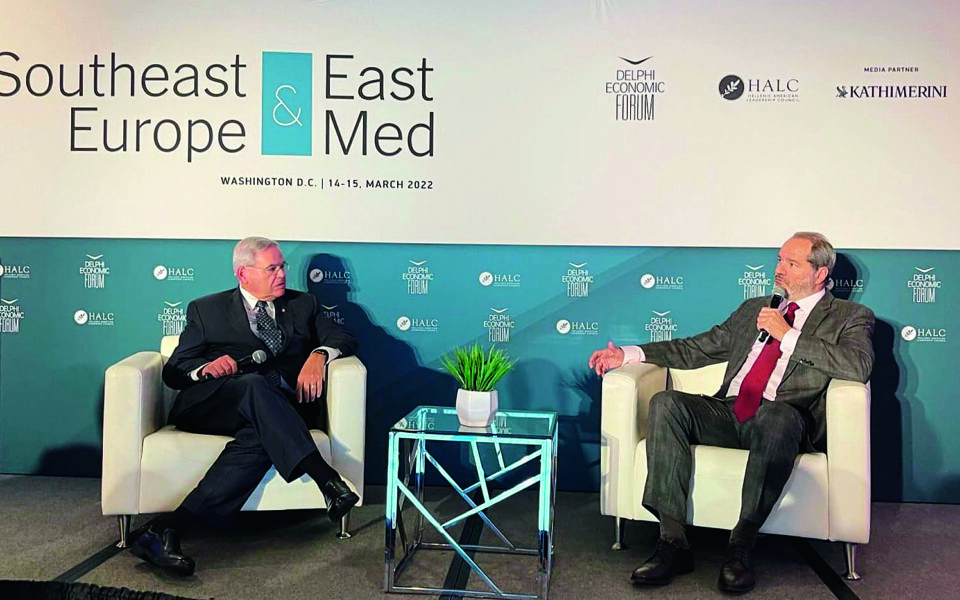
As the crisis in Ukraine exposes the risks of high energy dependence on Russia, the transit of Eastern Mediterranean natural gas to European markets via Greece is a serious proposition, far superior to that of depending on countries such as Venezuela or Iran, US Senate Foreign Relations Committee Chairman Bob Menendez says in an interview with Kathimerini.
Speaking on the sidelines of a conference organized in Washington by the Delphi Economic Forum and the Hellenic-American Leadership Council with the support of Kathimerini, Menendez says that Russian President Vladimir Putin has always wanted to revive the Soviet Union and that the war in Ukraine serves exactly that objective.
According to Menendez, as long as Turkey fails to respect international law, violates Greek sovereign rights, continues to occupy northern Cyprus and to encroach on neighboring states’ exclusive economic zones, it will not be able to purchase any new F-16 fighter jets from the US or upgrade its existing fleet.
The world is obviously a very different place since the war started in Ukraine. You have been clear-eyed about Russia for a long time. Where do you think things stand right now?
When I was in Greece, two years ago or so, I was asked to make a speech in Athens and I spent a fair amount of time talking about Russia, and people looked at me at times and said, “Why are you talking about Russia?” And of course I would talk about our relationship, the 3+1, and all of the legislative initiatives, but as someone who spent 30 years in foreign policy, and has been studying Putin for 30 years, Ι knew that after the collapse of the Soviet Union, his biggest desire was to recreate as much of it as possible, and in that pursuit, he invaded Crimea. And unfortunately we – the United States and the West – did not respond as we should. We basically gave him a slap on the wrist and the result is that he came to the conclusion he could continue.
And so, when I look at it today, I think he has made the most strategic mistake of his life. Why do I say that? Europeans are diversifying their energy supply to move away from Russia as their gas station. That’s Russia’s biggest single source of its economy. The transatlantic Alliance is stronger than ever before. NATO is stronger than ever before. There’s a new dynamic that’s taking place, consequently. He doesn’t want NATO and American troops on his western borders, this more now than ever before, because of his actions. And he lost Nord Stream and so much more. So when you think about it and the sanctions levied against him…
Is there any possibility of a de-escalation soon, or will things get worse?
I see that the continuation of the horrific war crimes in Ukraine will continue for a while, and that’s why we must do everything we can to help the Ukrainians fight for their freedom, to help the Ukrainians win this battle. We must continue to tighten the noose around Putin and we must continue to help the Ukrainians with the type of air defenses that they need in order to ultimately win this.
‘I’d rather not be looking at Venezuela, I’d rather not be looking at Iran, I’d rather not be looking at all these other countries when we have allies like Greece in the region’
I assume there won’t be any Western involvement.
Western involvement in a war zone is more of a direct confrontation, equivalent to WWII. But I hope he won’t make the huge mistake of using chemical weapons or dirty bombs. That would change the dynamics.
The level of Western – and especially European – unity must have been a surprise to Putin, who was probably counting on division among Western allies. How would the US view the emergence of a strong European foreign policy unity?
I think it’s clear the most significant security architecture that has been created that brought peace and prosperity to the world for 75 years, which is NATO, can be strengthened, as it now has to deal with the realities of the 21st century.
I welcome European engagement in meeting its security needs. I welcome the German decision now to spend 2% of GDP to move in that direction. I welcome other countries that are moving in that direction, but I would just say that our best way to achieve that goal of European defense is what has been successful for 75 years: strengthening NATO and meeting that obligation. There won’t be an attack on any European country that is a NATO country that won’t be responded to by us as well. And we are committed to that not only by our treaty obligations, but by the moral imperative.
While Western countries, including Greece, are stepping up, others are taking advantage of the current situation. Venezuela may get out of facing international isolation. Saudi Arabia is being courted after being long criticized by this administration. Iran may be escaping sanctions. Turkey asked Biden to expedite an F-16 sale and upgrade, despite still being in violation of the Countering America’s Adversaries Through Sanctions Act (CAATSA). What are the chances of Turkey getting American F-16s?
The reality is there’s only one committee that has jurisdiction over arms sales, in the Congress. I do not see sales of F-16s to Turkey unless there is a dramatic turnaround regarding the S-400s, a sense that the system has been sent out of the country, and a series of other things as well. So the charm offensive won’t work with many of us, although I understand what Turkey is trying to do at this moment.
But I think what’s more important is actions. If Turkey wants to act in a way that ultimately is befitting a true NATO partner, if Turkey wants to act in a way that observes international law, that doesn’t violate the sovereign rights of its neighbor Greece and its territorial waters and airspace, that doesn’t continue to [occupy the area captured in the] invasion of the northern part of Cyprus, and that respects the exclusive economic zones of its neighbors, that’s a different story.
But that’s not the Turkey that I see. What we cannot do, however, is – whether it’s Turkey, Venezuela, or any of these other countries – we cannot take the challenge of the moment and turn our back on our principles.
Recently, the State Department delivered a non-paper on the EastMed pipeline. Last week Chevron’s CEO suggested that the EastMed pipeline should be brought back into play. Could the administration, because of the Russia crisis, shift its policies on fossil fuel-based projects, and support EastMed?
You would think a non-paper would be a nonissue. The reality is that I’m deeply disappointed in the way the State Department dealt with our allies in the region regarding the viability of the EastMed pipeline, and I made that very clear.
Of course, at the end of the day, this is a question about commercial viability. But there is so much, whether it is EastMed or all of the interconnector work that has been done. I think the energy paradigm that I envisioned when I passed the East Med Act is still alive, very much so. I think that in a moment like this, from my perspective, while I am for renewable energy, at the same time, with the emergency of the moment, I’d rather not be looking at Venezuela, I’d rather not be looking at Iran, I’d rather not be looking at all these other countries when we have allies like Greece in the region, like Israel and others that can maybe be the source of that energy.

